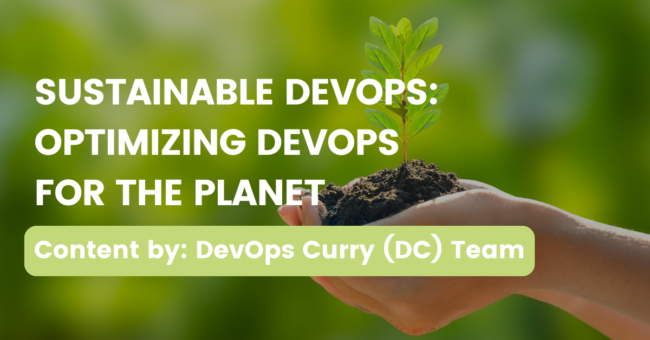Detail Information About Sustainable DevOps
Introduction & History Of Sustainable DevOps
Sustainable DevOps is a concept that combines the principles of sustainable development with the practices of DevOps. DevOps, a blend of “Development” and “Operations,” is a methodology aimed at improving collaboration between software developers and IT operations. It focuses on automating and integrating the processes of software development and IT operations to increase the speed and reliability of software delivery.
Sustainability in this context refers to practices that ensure long-term environmental, social, and economic health. Sustainable DevOps aims to make the process of developing, deploying, and maintaining software more environmentally friendly, cost-effective, and socially responsible.
DevOps emerged in the late 2000s as a response to the traditional separation between software development and IT operations. This separation often led to inefficiencies and slow release cycles. DevOps sought to break down these silos by fostering a culture of collaboration, continuous integration, and continuous delivery (CI/CD). By the mid-2010s, organizations began to recognize the importance of incorporating sustainability into their DevOps practices.
Environmental impacts of Software Development
You use a variety of software’s and applications throughout the day. Each software drains your mobile’s or PC’s battery at different speeds. To keep your battery and your device working, you need to charge or power them with electricity. Now unless you are getting it from solar panels or windmills, high chances are that the electricity you use comes from burning fossil fuels. These fossil fuels, as you must have read a hundred times in your school, are limited and cause pollution when burnt. In short, the software’s that you are using is directly linked to pollution, or in technical terms, carbon emission.
The carbon footprint of an individual software or the software carbon footprint is affected by the software’s code quality, architecture, network usage, etc.
Moreover, the devices and hardware that runs the software also emits large amounts of carbon during its manufacturing. After their life ends, they are dumped in landfill while only a minimal percentage of them gets recycled. This is called embodied carbon (or embedded carbon) which is the amount carbon emitted during the manufacturing and disposal of a device. This means that even if a hardware is not using much electricity, it has already contributed to the carbon footprint during its manufacturing. An FPT TV and desktop computers have a much higher embodied carbon while a smartphone has the least.
Image Credit: https://learn.greensoftware.foundation/assets/images/17_embodioed_carbon-9e6e805fdc5d2381d34fb0b391618e11.png
What is Sustainable DevOps?
Sustainable DevOps, also referred to as Green DevOps or DevGreenOps, is a DevOps approach that focuses on reducing the environmental impact of software development processes. In other words, you can say it is an ideology that sees DevOps as the key to reduce the carbon footprint of the IT development industry. It involves the use of eco-friendly DevOps practices and instilling a sense of responsibility among the company’s teams.
In another terms, it refers to the practice of integrating sustainability principles into the DevOps processes, aiming to create software and manage IT infrastructure in an environmentally friendly way. This involves optimizing resource usage, reducing energy consumption, and minimizing the carbon footprint of IT operations.
Sustainable DevOps practices
♦ Improving code efficiency
Poorly written or longer codes can increase the energy consumption of software and ultimately lead to more carbon emissions.
Green coding is defined by Stl Partners as “programming code that has been produced and written in a way that minimizes the energy consumption of software, thereby limiting the potential environmental impact.” Lazy loading (loading only those resources that are required at the moment) and caching mechanisms (locally storing frequently accessed data) are some green coding practices that help to save energy.
♦ Using cloud services
Cloud computing allows businesses to use computing resources (servers, storage, infrastructure, etc.) whenever required without relying on physical hardware. In addition to being cost-efficient, cloud computing has numerous environmental benefits as well.
Firstly, it reduces the need for physical hardware that, as discussed before, reduces carbon emissions. Then, some cloud providers use green data centers that run on renewable energy. Lastly, cloud resources are auto-scalable. This ensures that no extra energy or hardware is wasted while business requirements are also met.
♦ Continuous monitoring
In DevOps, continuous monitoring refers to constant monitoring and analysis of the development and operations processes. But in terms of sustainable DevOps, continuous monitoring refers to constantly checking the environmental impact of software’s instead. It involves tracking parameters like carbon emissions, energy consumption, and resource utilization.
Carbon Footprint, released by Google Cloud in 2022, is a monitoring tool that helps businesses track their carbon emissions based on their Google Cloud platform usage.
♦ Automation
Automation can help in efficient resource utilization and make sure resources are used only when necessary. It can automatically scale up resources (like servers) during peak times and scale down during peak-off times. In this way, it also helps in reducing unnecessary costs. Automated monitoring tools can help monitor carbon and energy efficiency as discussed before. They can also be used to detect anomalies and inefficient codes.

